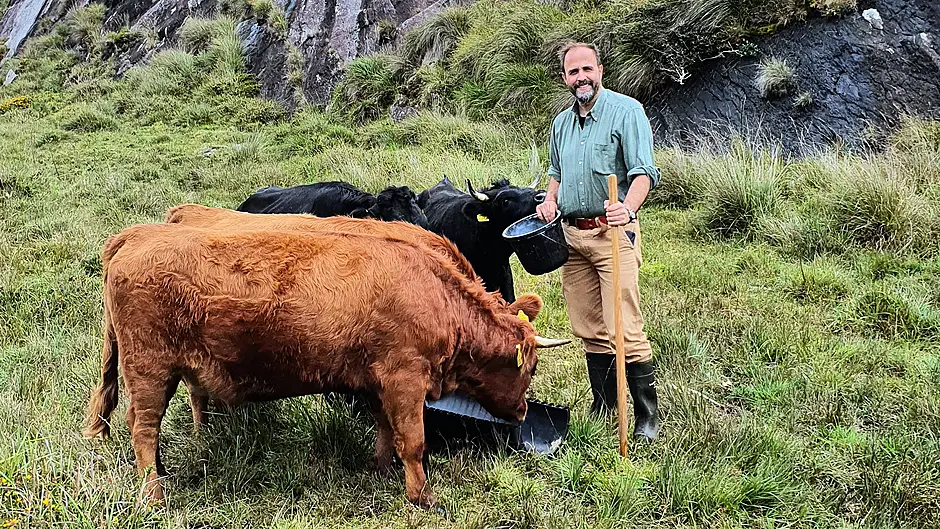A holiday in Beara for Dubliner Eoghan Daltun resulted in a major lifestyle change for the writer and sculptor – and it also led to him deciding to undertake the major task of rewilding a local forest
THERE needs to be an option of getting payments for not farming if we’re serious about preventing the complete collapse of nature.
That’s the fervent viewpoint of Eoghan Daltun, who over the past 13 years has created a temperate rainforest on what was previously ecologically wrecked land on the Beara Peninsula.
Eoghan has written about his experience in his new book An Irish Atlantic Rainforest, a Personal Journey into the Magic of Rewilding.
From Dublin, Eoghan spent seven years studying sculpture in Tuscany.
In July 2008, he and his family were holidaying in Beara, when Eoghan viewed a farm that marked a turning point in his life. ‘Within seconds I knew with absolute clarity where I wanted to spend the rest of my life … it was a case of love of first sight.’
Having relocated to West Cork, his plan was to conserve the native woodland on his newly-purchased land, but very quickly he became aware that he had an ‘ecological car crash’ on his hands.
‘Apart from the tree trunks and mosses, there was virtually no vegetation from about chest or head height down: everything else had been stripped bare,’ he said.
The cause, he quickly realised, was a large herd of feral goats, and smaller numbers of sika deer whose overgrazing had led to an invasion by non-native plants, the worst of which was the toxic rhododendron.
The following year, Eoghan got a grant of nearly €37,000 to erect a two metre-high fence to keep grazing animals out of his 21-acre holding Bofickil which, over a period of time, literally saw life explode.
The intervening years saw Eoghan bringing life back to the land, with a new temperate rainforest spontaneously forming where there was previously barren grass.
He keeps dexter cattle and also has a business restoring sculpture.
He accepts what he’s doing isn’t the norm on the peninsula, and he insists he’s not trying to force an agenda on anyone else.
But as an amateur ecologist, if he had to share a learning with conventional farmers, what would it be?
‘What I’d say is that if they see environmentalism as the enemy, they’re mistaken because farming will be probably the worst affected human activity if climate and ecological collapse worsens,’ he said.
If we demolish climate stability, agriculture is going to be impossible and that’s already happening in parts of the globe, he said.
‘I think a lot of farmers, not all, if conditions were different, would like to be a part of the solution, or to play a part in reversing the collapse of nature. But as things currently stand, that’s very difficult for them because the farm subsidies system as it exists makes it impossible, where the amount you get is based on the amount you farm.’
Eoghan stresses he doesn’t blame farmers but blames the system.
‘That looks like it’s due to partially change soon, which is a big step forward, but it’s not nearly enough.
‘What we really need to be doing if we’re serious about reversing the collapse of nature in this country, is giving farmers the option – it shouldn’t be mandatory – of receiving farm payments for not farming their land.
‘I think we need to change the definition of what it means to be a farmer at all. We need to widen it out to include producing natural habitat. I don’t think anything less will make a difference.’
He said he was encouraged by the amount of attention his work is receiving.
‘I think there is a hunger out there for change and a growing awareness of the need for change.
‘My goal is to keep going and get the message out there that this needs to happen on a much bigger scale or we’re going to lose wild nature.’
He jokes that he doesn’t wake up in the morning to the sound of monkeys, but he says the radical changes to his forest is ‘mindblowing’.
As well as trees, pine martens are back, so are otters, along with horseshoe bats, and barn owls.
‘Playing a role in the return of vitality to, and spontaneous expansion of, a wild nature rainforest in Beara has unquestionably been the most deeply fulfilling and meaningful thing I have ever undertaken.’
But he is still fearful for the future.
‘Anyone who isn’t hasn’t grasped what’s going on – it’s just a statement of fact.
• An Irish Atlantic Rainforest: A personal journey into the magic of rewilding, is published by Hachette Ireland.







